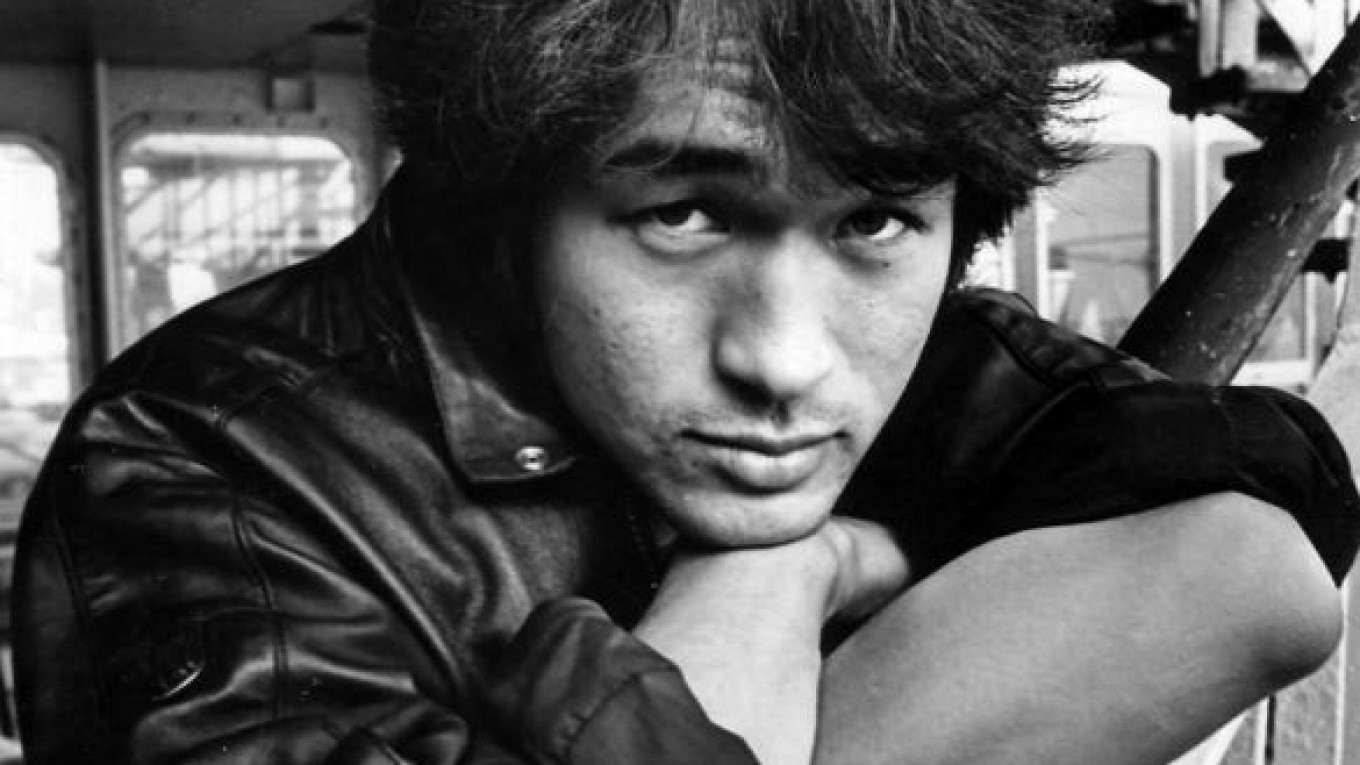Looking back on accounts of Viktor Tsoi's life, it seems the Soviet rock martyr celebrated friends' birthdays more loudly than his own. Books of remembrances note numerous birthday parties, including the 1982 gathering where Tsoi met his future wife Marianna, but don't mention any thrown for Tsoi himself.
Since Tsoi's death in 1990, however, birthday concerts for the Leningrad rocker have become somewhat of a tradition, and a variety of events will commemorate Tsoi's 50th birthday this week with a fair amount of pomp and circumstance, including a concert Friday at Club Milk.
Tsoi, the frontman and main songwriter for the band Kino, died in a car crash two months after his 28th birthday. His untimely passing, combined with his now-classic repertoire of moody post-punk anthems that spoke for the disillusioned youth of the late Soviet Union, turned Tsoi into a musical hero and cultural icon along the lines of Kurt Cobain or Jim Morrison.
"I grew up on his music. In Russia, where nothing ever changes, there will always be a demand for those like Tsoi, serious poets of their time," said Alexander Ivanov, vocalist of the long-running punk group NAIV.
"Rock stars occupy a very important space in people's consciousness in the modern world ... They see us through dark times," said Brazzaville frontman and former Beck collaborator David Brown, who will perform an English-language version of a Kino song at the Milk show. "Tsoi was like that for people in the last days of the Soviet Union."
Recently, Tsoi's music has been cast in a new light by post-Soviet dissidents: His song "I Want Change" was played at many of the opposition rallies that were organized since the State Duma elections late last year.
Those in power have been celebrating Tsoi's legacy as well. On June 3, the city government of St. Petersburg and the National Portrait Gallery unveiled a two-month outdoor exhibit on the pedestrian street Malaya Sadovaya featuring 44 photographs of Tsoi by Sergei Bermenyev. At the opening, Governor Georgy Poltavchenko said he is a "fan of the work of Viktor Tsoi."
Other exhibits related to Tsoi's life have opened in cities such as Voronezh. A multitude of musical events are also planned around Russia to loosely coincide with Tsoi's 50th, including festivals in Smolensk, Sterlitamak and Nizhny Novgorod, the latter of which will feature the Kino tribute band Viktor.
Viktor will also perform at the festival Viktor Tsoi – 50, which stopped in St. Petersburg on Thursday and comes to Club Milk Moscow tonight. The show puts a new spin on the Tsoi birthday-concert format with the inclusion of foreign musicians Jean Luc Debouzy of France and Brown's band, Brazzaville.
At the festival, Brazzaville will play one song, their 2006 English version of Tsoi's hit "A Star Called Sun." The band has been to Russia several times since 2003, when music critic Artemy Troitsky brought the group over to perform in Moscow and St. Petersburg. Brown has written several songs about Russia while on tour here, and he's appeared on local radio and television as part of shows hosted by Mikhail Kozyrev.
The songwriter discovered Kino during a tour stop in Sochi, when the opening chords of the song "Pack of Cigarettes" coming out of a beachside bar stopped him in his tracks, he said.
Although Brown speaks only a little Russian, he lauded Tsoi's phrasing, melodies and chord progressions. The chord progression of Tsoi's "A Star Called Sun" inspired him to do his own take on the tune, which is a sing-along favorite among Russians. His version employs the same basic melody, chords and cosmic motif as the original, but the lyrics deal with the death of Brown's mother.
Brown said that although Tsoi sang in Russian, he was a musician on the level of David Bowie, another artist Brown has covered.
"If he happened to be born in another country, he'd be as big as David Bowie, because he's just that good," Brown said.
"Viktor Tsoi – 50" is on Friday at 8 p.m. Milk Moscow. 9 Ulitsa Sergeya Makeyeva. Metro Ulitsa 1905 Goda. Tel. 726-0998.
Alexander Bratersky contributed to this report.
A Message from The Moscow Times:
Dear readers,
We are facing unprecedented challenges. Russia's Prosecutor General's Office has designated The Moscow Times as an "undesirable" organization, criminalizing our work and putting our staff at risk of prosecution. This follows our earlier unjust labeling as a "foreign agent."
These actions are direct attempts to silence independent journalism in Russia. The authorities claim our work "discredits the decisions of the Russian leadership." We see things differently: we strive to provide accurate, unbiased reporting on Russia.
We, the journalists of The Moscow Times, refuse to be silenced. But to continue our work, we need your help.
Your support, no matter how small, makes a world of difference. If you can, please support us monthly starting from just $2. It's quick to set up, and every contribution makes a significant impact.
By supporting The Moscow Times, you're defending open, independent journalism in the face of repression. Thank you for standing with us.
Remind me later.






